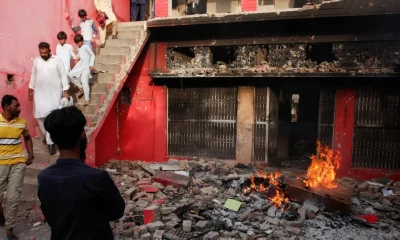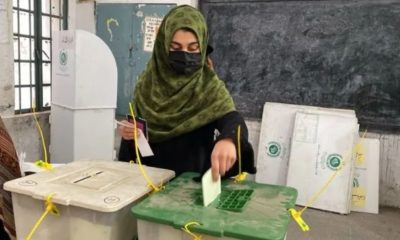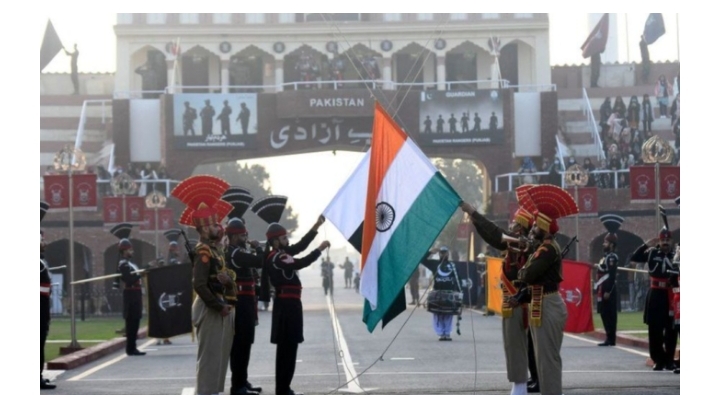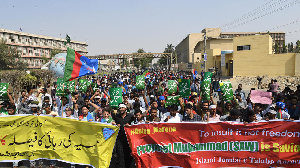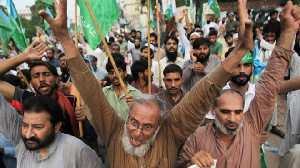Asia
Pakistan elections 2024: Polls close after mobile internet cut
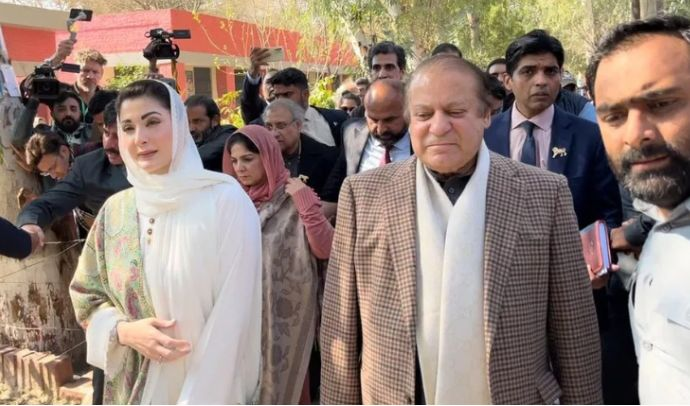
Polls have closed in Pakistan after the authorities suspended mobile calls and data while millions voted for a new government in a controversial election.
The interior ministry said incidents of terrorism made the measure necessary.
The election comes almost two years after the previous prime minister, cricketer-turned-politician Imran Khan, was ousted in a no-confidence vote.
Three-time PM Nawaz Sharif was on the ballot in what many analysts say is Pakistan’s least credible election yet.
Khan, jailed on corruption charges last year, is barred from standing and his party called the internet cut a “cowardly act”.
Polling experts were already forecasting a low turnout, which it’s thought would hamper the PTI’s chances. The suspension of mobile services made it harder for voters to find their polling stations.
Both calls and data services were suspended just 10 minutes before voting started, although wifi networks still appeared to be working.
One voter told the BBC they were shocked at the decision, saying “voters should be facilitated instead of [having to be met with] such hurdles”.
Another said she had been expecting a blanket shutdown.
Many voters in the city of Lahore told the BBC that the internet blackout meant it was not possible to book taxis to go and vote, while others said they couldn’t chat to other family members to co-ordinate when to head to polling stations.
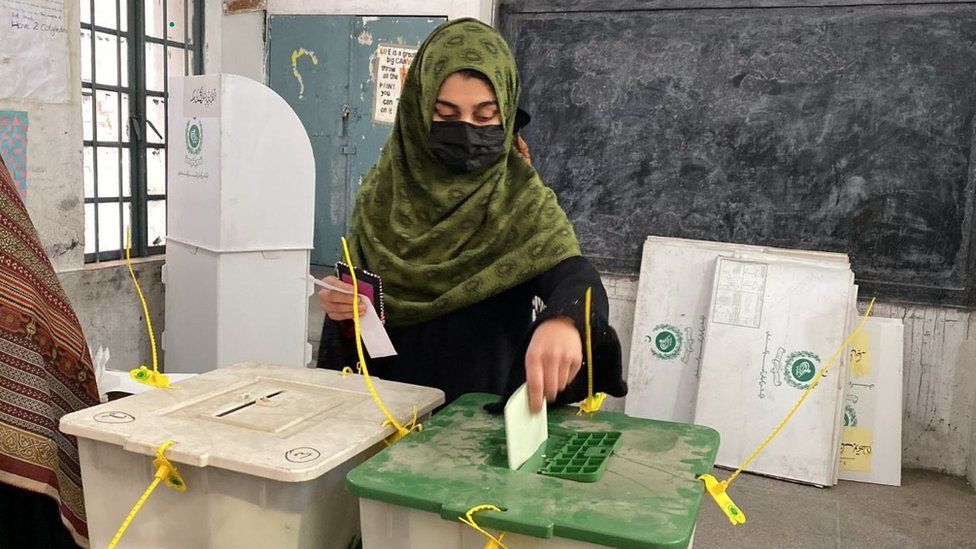
Justifying the move, an Interior Ministry spokesman said: “As a result of the recent incidents of terrorism in the country, precious lives have been lost. Security measures are essential to maintain law and order situation and to deal with potential threats.”
Pakistan has a history of militant attacks but over voting day there were only isolated incidents of violence. In the worst, in Dera Ismail Khan in the north, four police officials were killed in a bomb attack on their vehicle. Several injuries were reported in blasts in south-western Balochistan province, but no casualties.
The shutdown was also criticised by Pakistan People’s Party (PPP) leader Bilawal Bhutto Zardari, son of murdered ex-Prime Minister Benazir Bhutto, who called for services to be restored “immediately”.
The country is on high alert, with a heavy security presence at polling stations across the country. One station in Lahore the BBC visited had armed guards at the entrance and army officers roaming around the area.
Border crossings with Afghanistan and Iran have been closed for both cargo and pedestrians to “ensure full security” during polling, a spokesman from Pakistan’s foreign ministry said.
The country has in the past cut internet services to control the flow of information – though a shutdown of this extent is unprecedented, especially during an election.
Absolutely fair election: Nawaz Sharif
Mr Sharif and his daughter Maryam voted in Icchra, Lahore on Thursday afternoon. Security was tight, with officers forming a ring around them and a jeep covered in antennas to jam phone signals.
Black cars lined the area as the pair entered the station.
When asked if he thought the election was free and fair, Mr Sharif said they were “absolutely fair”.
Speaking to the BBC outside the polling station after casting his vote, he said he had “never had any problems with the military”, perhaps forgetting he’d spent much of his long career at loggerheads with the generals.
Mr Sharif spoke of the “lack of civility, the arrogance, and this culture of disrupting and destroying the country”, in an apparent reference to Pakistan under Imran Khan.
He said he and his family had gone to jail, “made sacrifices and now we are here witnessing this day”. If his party wins, “people’s lives will become easier, inflation will go down – this is what people want, this is their wish – and their wishes should come true”, he added.
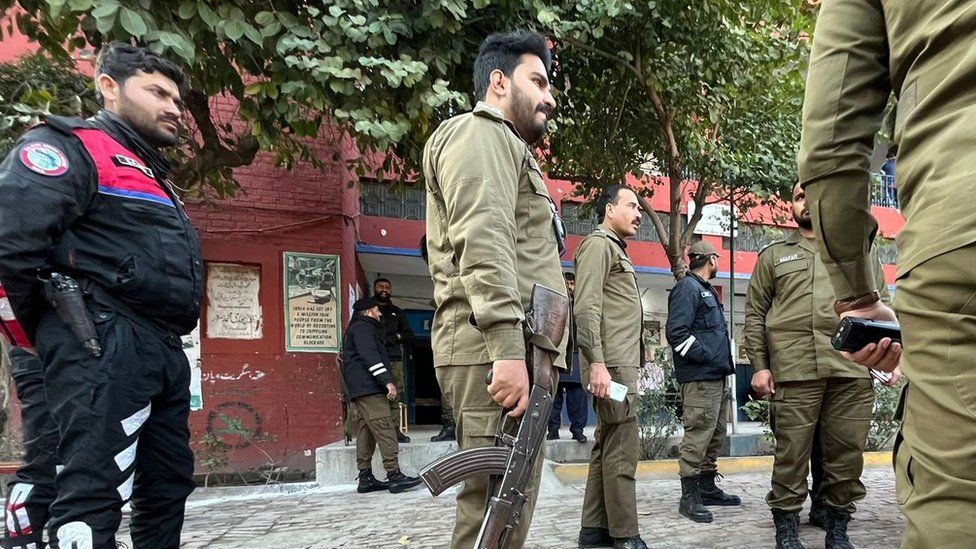
Outside one polling station in the city of Multan in Punjab, some female polling agents told the BBC they were not allowed to enter polling booths – and therefore could not observe the polling process.
Typically, female polling agents are given a seat inside booths.
In Lahore, dozens of voters crammed into the small corridors of a school in Naseerabad, with some saying they had been waiting for more than two hours to vote.
Rising violence and economic struggles
As many as 128 million people are registered to cast their votes, almost half of whom are under the age of 35. More than 5,000 candidates – of whom just 313 are women – are contesting the 266 directly-elected seats in the 336-member National Assembly.
The Pakistan Muslim League (Nawaz) (PML-N) and the PPP are considered the two major parties going into the vote.
However, picking out candidates from Khan’s Pakistan Tehreek-e-Insaf (PTI) party is more difficult, after it was banned from using the cricket bat symbol under which all its candidates run.
The move has forced PTI-backed candidates, who are running as independents, to use other symbols instead, including calculators, electric heaters and dice. Electoral symbols play a key role in a country where more than 40% are unable to read.

The PTI allege other tactics have also been used to prevent their candidates from campaigning for and winning seats, including locking up PTI members and supporters and banning them from holding rallies, effectively forcing them underground.
Imran Khan is serving at least 14 years in prison, having been sentenced in three separate cases in the space of five days last week. The PTI alleges interference by Pakistan’s powerful military, with whom Khan is said to have fallen out before his ousting and imprisonment.
But people were able to vote for Nawaz Sharif – the PML-N leader, who at the time of the last election was beginning a sentence for corruption.
The former PM was ousted in a 1999 military coup and had his third term cut short in 2017 – but he recently returned from self-imposed exile. He had his lifetime ban on holding office overturned, and also got his criminal record wiped clean at the end of last year, allowing him to stand for what would be a record fourth term.
However, whether any party can win a majority – which requires 169 seats in parliament – is not yet clear.
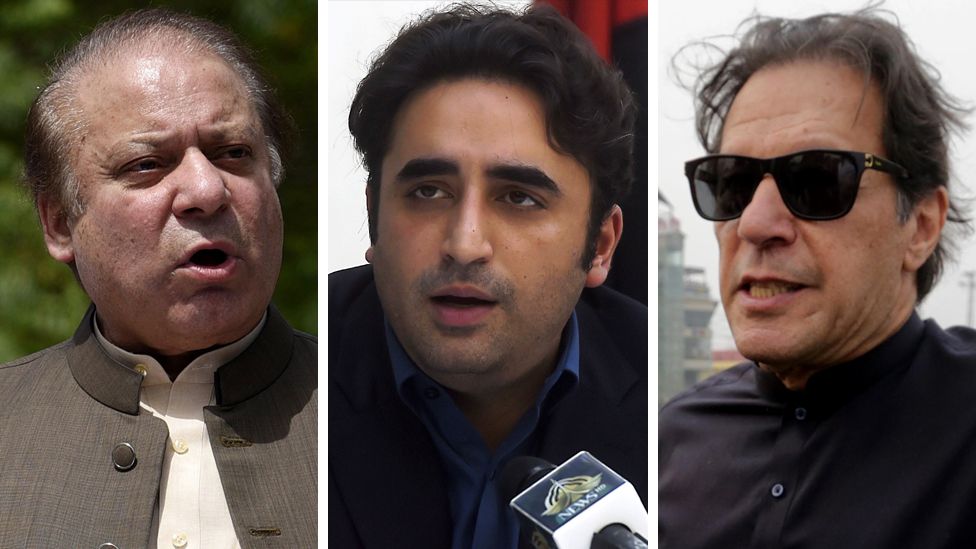
Millions have been hit hard by the country’s economic woes, which were exacerbated by devastating floods in 2022. Inflation is soaring, and people are struggling to pay their bills. Violence is also on the rise.
According to the Islamabad-based Center for Research and Security Studies (CRSS), 2023 also saw violent incidents increase for the third year in a row in Pakistan, with the most recorded fatalities – including security forces, militants and civilians – since 2017.
The Election Commission of Pakistan has categorised half of the 90,675 polling stations as either “sensitive”, meaning there is a risk of violence, or “most sensitive”, indicating a higher risk. The classifications are based on the region’s security situation and history of electoral violence.
Although voting has ended, strict rules around election coverage – including what can be said about candidates, campaigning and opinion polls – remain in place until 23:59 local time (19:00 GMT) on Thursday. It’s unclear how soon results will be announced but they must be released within two weeks of the vote.
Additional reporting by BBC Urdu and Flora Drury
-

 Lifestyle1 month ago
Lifestyle1 month agoRoad Safety Authority narrates how buttocks causes road accident
-
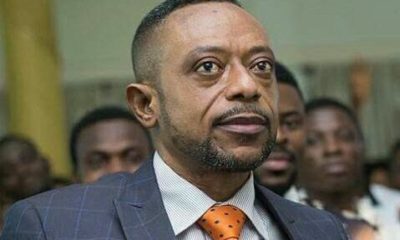
 GENERAL NEWS1 month ago
GENERAL NEWS1 month agoWhy 15 police officers stormed Owusu Bempah’s church – Kumchacha narrates
-
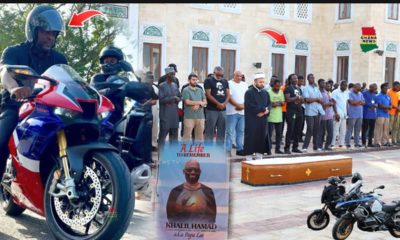
 GENERAL NEWS1 month ago
GENERAL NEWS1 month agoWatch how Ibrahim Mahama rode Honda superbike to pay last respects to late friend
-
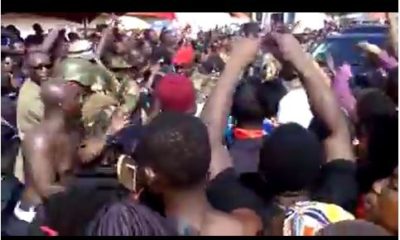
 GENERAL NEWS1 month ago
GENERAL NEWS1 month agoHow Offinso residents storm destooled queen mother’s house, demand for new chief
-

 South Africa News1 month ago
South Africa News1 month agoWoman thrown out of a speeding taxi while on her way to work
-
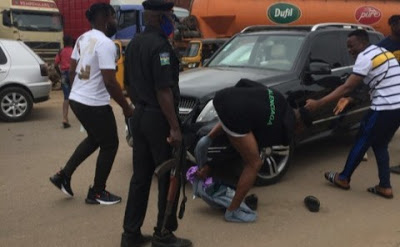
 GENERAL NEWS3 weeks ago
GENERAL NEWS3 weeks agoDeadly clash between youth and navy personnel results in two deaths at Tema Manhean
-

 SHOWBIZ KONKONSAH3 weeks ago
SHOWBIZ KONKONSAH3 weeks agoJunior Pope’s Death: Video of John Dumelo refusing to join canoe for movie shoot over safety concerns resurfaces
-
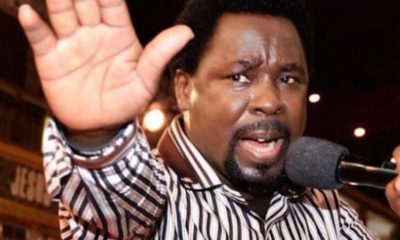
 News Africa2 months ago
News Africa2 months ago‘Satanically dubious’ – SCOAN releases statement on BBC’s report about TB Joshua, church

